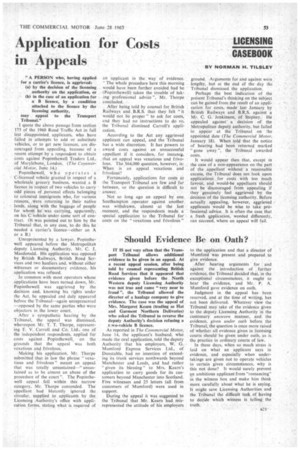Should Evidence Be on Oath?
Page 55

If you've noticed an error in this article please click here to report it so we can fix it.
IT IS not very often that the Transport Tribunal allows additional evidence to be given in an appeal. At a recent appeal session, after being told by counsel representing British Road Services that it appeared that evidence given before the North Western deputy Licensing Authority was not true and came "very near to fraud ", the Tribunal allowed the director of a haulage company to give evidence. The case was the appeal of Mrs. Margaret Kearn (trading as Hat and Garment Northern Deliveries) who asked the Tribunal to reverse the deputy Authority's decision refusing a towo-vehicle R licence.
As reported in The Commercial Motor, June 14, the applicant's husband, who made the oral application, told the deputy Authority that his employers, W. G. Mumford Express Services Ltd., of Dunstable. had no intention of extending its trunk services northwards beyond Manchester and Leeds, and had rather "given its blessing" to Mrs. Keara's application to carry goods for its customers beyond Manchester into Scotland. Five witnesses and 25 letters (all from customers of Mumford) were used in support.
During the appeal it was suggested to the Tribunal that Mr. Ream had misrepresented the attitude of his employers to the application and that a director of Mumford was present and prepared to give evidence.
After hearing arguments for and against the introduction of further evidence, the Tribunal decided that, in the exceptional circumstances, it ought to hear the evidence, and Mr. P. A. Mumford gave evidence on oath.
Judgment in the appeal has been reserved, and at the time of writing, has not been delivered. Whatever view the Tribunal may take of the evidence given to the deputy Licensing Authority in the customary unsworn manner, and the evidence, given under oath before the Tribunal, the question is once more raised of whether all evidence given in licensing courts should be given under oath, as is the practice in ordinary courts of law.
In these days, when so much stress is laid on what an applicant says in evidence, and especially when undertakings are given not to operate vehicles in certain given circumstances, why is this not done? It would surely prevent an ambitious applicant from "romancing" in the witness box and make him think more carefully about what he is saying. It might save Licensing Authorities and the Tribunal the difficult task of having to decide which witness is telling the truth.












































































































































